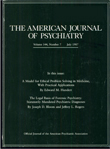TO THE EDITOR: The APA Commission on Psychotherapy by Psychiatrists has major points of disagreement with the redefinition of psychiatry put forward by Jeffrey A. Lieberman, M.D., and A. John Rush, M.D. (
1). Drs. Lieberman and Rush outline a residency that would eliminate substantive training in skills essential to the basic psychological understanding and management of patients, as well as the complexities of psychotherapy.
Drs. Lieberman and Rush have highlighted the economic forces driving many of today's medical decisions. We are all struggling to do more with less. The authors have seen in this struggle a need to redefine our specialty and our patient population by extending our specialty to include all patients, including those in neurology and internal medicine who have behavioral disturbances. Residents would spend 1 year in general medicine and a second year focused on neurological disorders—and a third year might combine inpatient and outpatient experience in psychiatry. Starting a psychiatric residency with 2 full years in other medical specialties strikes us as an extremely poor way to facilitate identification with the distinctive role of the psychiatrist.
The strength of psychiatry lies largely in its expertise in the integration of the biological and the psychological in diagnosis and treatment. Drs. Lieberman and Rush lean heavily on the biological side of the balance, and their recommendations would almost certainly result in producing residents who were poorly prepared in such areas as the psychodynamics of prescribing, the art of forming a therapeutic alliance, and the necessary expertise to conduct competent psychotherapy.
A recent study (
2) demonstrated that psychotherapy changes brain function. Psychotherapy is no less a “medical” treatment than pharmacotherapy. The great strength of psychiatry and its appeal to future trainees lie in the emerging possibilities for integrating psychological and biological knowledge in an exciting new science of mind/brain unity. If psychiatry abdicates psychotherapy to nonmedical professions, there will be no discipline that can carry out this integration.
We foresee that in the future psychiatrists will need to be increasingly knowledgeable about every aspect of their specialty. They will be dealing with the most difficult and challenging patients. They will be delegating, supervising, and organizing. One cannot supervise a treatment in which one has no experience or competence.
If psychiatrists are to remain leaders in the treatment of the mentally ill, psychiatric training and education must be comprehensive. The foundation must include a solid understanding of the most current information about “mind” (learning theory, psychoanalytic theory) and “brain” (molecular neurobiology, neurotransmitters). From this basis, the fundamentals of diagnosis, psychopharmacology, and psychotherapy must be taught and clinically applied.
In order to become a specialist, rather than a technician with only cookbook knowledge, residents must learn psychotherapy firsthand. Psychodynamic, cognitive/behavioral, family, and group theories and treatments provide the fundamental elements for the interpersonal and communication skills that psychiatrists use in every clinical situation. Extensive clinical experience over several years is necessary in order to incorporate this knowledge base fully into the matrix of psychiatrists' clinical armamentarium.
Residents choose the field of psychiatry for a mélange of humanitarian, intellectual, and philosophical reasons. Our tradition works uniquely at gaining understanding of the human condition by using all of our available perspectives in the service of healing. Our residents do not enter psychiatry to become partially trained internists or neurologists—thereby doing neither well and blurring their primary professional identities for themselves and for colleagues in the other medical specialties.
In Lieberman and Rush's model, psychiatry's wealth of well-founded knowledge of human psychology and psychotherapy would be lost to our future residents, and with it would be lost much that attracts physicians to our field.

